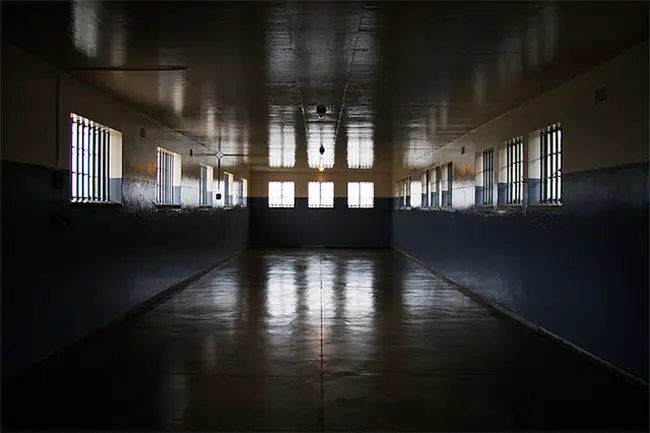
A Leon County circuit judge Friday blocked a plan to privatize 29 prison facilities, ruling that lawmakers violated the Florida Constitution by approving the changes in the fine print of the state budget.
Judge Jackie Fulford’s ruling had an immediate effect: The Department of Corrections suspended Tuesday’s scheduled opening of bid proposals from companies that want to run the prisons.
Click On:
- Florida Lockups Lite: Closing Prisons and Boot Camps, Privatizing Inmate Healthcare
- The Privatization-Industrial Complex
- Private Corrections Working Group
Fulford, in a six-page order, said the constitution required lawmakers to change state law or use an already-existing department review process before privatizing the prisons. Instead, legislative leaders put the privatization plan in budget fine print, known as proviso language.
“Based on the record before it, this court concludes that if it is the will of the Legislature to itself initiate privatization of Florida prisons, as opposed to DOC (initiating it), the Legislature must do so by general law, rather than ‘using the hidden recesses of the General Appropriations Act,’ ” Fulford wrote, partially quoting a decades-old Supreme Court ruling.
Fulford’s order was a victory for the Florida Police Benevolent Association, which along with three correctional officers, challenged the plan this summer. The PBA has long fought prison privatization efforts, which eliminate state jobs.
“You’ve got 4,000 officers today (who) just breathed a sigh of relief,” PBA Executive Director Matt Puckett said shortly after Fulford released the opinion Friday morning.
An appeal is widely expected, though Department of Corrections spokeswoman Gretl Plessinger said officials were studying the ruling and “determining our options.” The department is the defendant in the lawsuit, though the Legislature approved the privatization plan.
House and Senate leaders also indicated they were reviewing the ruling. But Senate President Mike Haridopolos, R-Merritt Island, and House Appropriations Chairwoman Denise Grimsley, R-Sebring, disputed arguments that legislative leaders put the prisons plan in the proviso language with little scrutiny.
“The bottom line is that the language was approved through a public and transparent process,” Grimsley said in an e-mail. “Any accounts that the language was placed into proviso at the last minute are incorrect.”
Haridopolos said, in part, that the Senate’s budget proposal included proviso language about privatizing prisons before negotiations with the House began.
“Later, that proviso language was amended during the normal conference (negotiating) process — completely in the sunshine,” Haridopolos said in a statement released by his office. “It was not, as some reports have indicated, added in at the 11th hour of the legislative session.”
Puckett said the PBA had heard rumblings earlier about privatization but didn’t expect the plan to be so far-reaching. He described Fulford’s ruling as a “pretty strong condemnation on how they did this.”
Similarly, St. Petersburg Rep. Darryl Rouson, the ranking Democrat on the House Justice Appropriations Subcommittee, said a “full and fair debate is necessary” on privatization issues.
“Today’s ruling reaffirms that it is entirely inappropriate for legislative leaders to avoid a thorough debate about a controversial issue like prison privatization by tucking it in the fine print of the state budget,” Rouson said in a prepared statement.
The proviso language offered a roadmap to privatize prisons, work camps and other types of correctional facilities in 18 counties across the southern part of the state.
Jonathan Glogau, chief of complex litigation in the Attorney General’s Office, argued during a hearing Thursday that the proviso language did not ensure that privatization would occur.
The language called for the Department of Corrections to solicit proposals from private companies and then submit a plan to the Legislative Budget Commission by Dec. 1. If approved by the commission, the proviso said the department “may” award a contract to a private company.
But Fulford did not appear to buy that argument, writing that the proviso language “mandates that DOC privatize numerous facilities in a single procurement.”
Also, she said lawmakers did not follow a privatization process that already is in state law. That process gives the Department of Corrections a major role in doing analyses and deciding whether to move forward with privatization.
“(The) court reiterates that DOC could have privatized the prisons under existing law, so long as DOC acted consistent with existing law, or the Legislature could have passed a new law permitting privatization,” she wrote. “This court merely reaches the simple conclusion that the Legislature may not change existing substantive law by a proviso in an appropriations act.”
–Jim Saunders, News Service of Florida
![]()





























William says
Good for the judge.
Privatization of the prison system does not benefit the public.
Only the corporation, and its shareholders.
It is simple economics. Cut out the middleman.
Jack says
Privatization is GOP code for corporate welfare.
Nancy N. says
Good. Scott was trying to circumvent state law to line the pockets of his corporate buddies and donors, by doing something that was of no benefit whatsoever to the state or the people it served.
John Boy says
The private prision owners where the largest campaign contributors to The Fraudster’s election. He was trying to pay back what he owed, criminal’s like Scott should be taken outback and hung